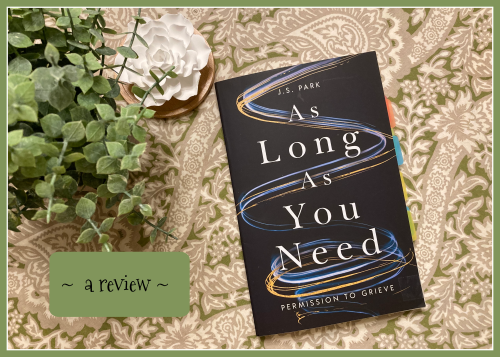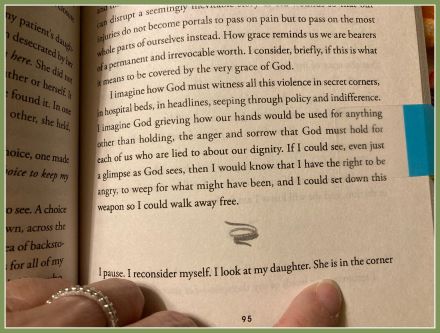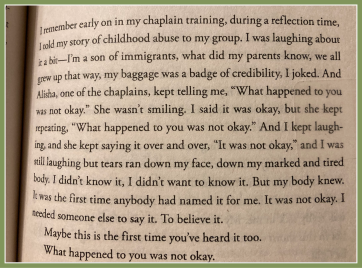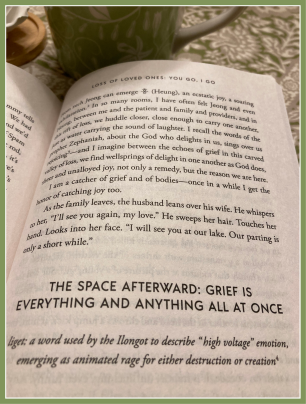#sponsor #partner
Here is just the book you might need…that you don’t want to need. Because grief is not only hard to experience; it’s hard to read about. Or talk about. As you see, I called J.S. Park’s As Long As You Need: Permission to Grieve “remarkable” in my blog post title. It’s honest, heartbreaking, vulnerable, truthful, breathtakingly painful but offering grace–the very qualities that make it remarkable and quite unusual. Let me share more with you about this book, and my experiences with it.
From the publisher about As Long As You Need
“Veteran hospital chaplain to the sick, dying, and bereaved, J.S. Park offers you both the permission and the process for how to grieve and heal at your own pace.
In As Long As You Need, J.S. Park offers an honest and unrushed engagement with grief, decoding four types of grieving–spiritual, mental, physical, and relational–and offering compassionate self-care and soul-care along the way.
If you are struggling to process loss, pain, or grief from the last few years or the last few minutes, J.S. is an experienced and deeply empathetic listener and grief catcher who has held the pain and questions of thousands of patients. While social and cultural narratives about grief are dominated by “letting go, moving on, or turning the page” in his nearly decade of service as a chaplain at a major hospital with a designated level one trauma center J.S. understands firsthand how rushing or suppressing grief only adds a suffocating layer of pain on top of the original wound.
From his unique window into the stories of the ill, injured, dying, and their families, J.S. offers you:
- Permission to dismantle all too common myths about grief and replace them with a guilt-free and unrushed approach to navigating your losses.
- Encouragement for how entering grief, rather than avoiding it, leads to a hard but meaningful holding of your loss.
- Empathy and hope if you are struggling with a crisis of faith in the midst of grief.
- Recognition that grief spans a wide narrative of loss: loss of future, faith, mental health, worth, autonomy, connection, and loved ones.
- Affirmation that your grief is your own. While the DNA of grief might be universal to the human condition, how you experience and process grief is unique to you.
From the ER to deliveries to deathbeds across every sort of illness and injury imaginable, J.S. Park has provided meaningful counseling for people from all walks of life and death. Now, through his book, he wants to assure you that, while everybody else might rush past your pain, grief is the voice that says, take as long as you need.”
My impressions and experiences with As Long As You Need
Here is something that I didn’t know I’d need to learn how to do in my life: grieve. Something else that I didn’t know is that I’d have numerous occasions to practice this process. And unfortunately, what happened over time is that I must have unknowingly decided that the best way to get through grief was to package it up and tuck it away. (Here is where a Narrator could say, “It was NOT the best way.”) Why did I choose this way through grief? I suspect the answers include my own brokenness, busyness, family roles, and my own American culture, among others. After all, we’re a “Pull yourself up by your bootstraps!” nation! Unlike the Bible heroes and heroines I admire, who poured out their grief audibly or tore their garments, in public and in private. Or wrote heavy-duty psalms and songs about grief and pain. Even Jesus wept. But what does that look like for me, as a 21st century Western woman?
I’ve been so moved by J.S. Park’s book. It’s both memoir and guidebook; using his own life and the lives (and deaths) of the patients and families he served as a hospital chaplain, Park shares:
- Why the Western model of grief doesn’t serve us
- How our faith in God can be shaken by loss and grief
- How trauma, in its many forms, devastates the spirit and the soul
- Why the “easy answers” of why loss happens won’t ever be enough
- And SO much more
What *do* we need when we grieve? Everyone needs something different. And everyone needs varying amounts of time. What I’ve taken from this book that has been most meaningful to me are these truths: when abuse happens to us, it isn’t okay. That there isn’t a timetable for my grief, but processing it is vital. That trauma does get passed on–but it doesn’t have to be. That God CARES about my grief and suffering. That we humans are worth more than we can do or produce.
That’s just a little of the great value that Park shares in As Long As You Need. So much of this value is communicated by human stories, too. And content warnings at the beginnings of each chapter let the reader know that the stories aren’t for the timid or faint of heart. They include accounts of overdoses, of officer-involved shootings, of violence; of the loss of preterm babies, of grandparents, of people of color, of various genders, of suicide; of depression and racism. And this isn’t even a complete list (and sheds light on why Park’s own story includes the pain he experienced in caring for his patients).
But you know what that list is? It is about real humans and their real lives. And Park’s retelling of those lives, and deaths, can help us to learn that grief doesn’t have to be a “one-and-done” or denied and hidden away, but experienced, expressed, spoken. It doesn’t have to look a certain way.
This is a book that has the potential to change you. To help you grieve, and to know that you are loved. It really does tell the story of grief in a way I’ve never experienced. Perhaps this is a book that you need for yourself. Keep reading for J.S. Park’s book trailer, and for info on where you can get a copy. I’m also including some of my favorite quotes below.
Words from this book that I needed to read
I feel that God brought some important words from As Long As You Need to my attention. Some of them are piercing and painful. Yet I’ll be thinking on them; and I’ll remember. I hope I will use them to pray.
- “For a moment, I look behind me. It’s not lost on me that he’s in the corner and I am with him. I am in his corner.“ (p. 91, emphasis mine)
- “I had learned in chaplaincy about trauma. It was defined as the imprint left by a harmful event that outweighs our resources to cope with it. It’s been said that epigenetic trauma gets passed on to our children, either by blood or by bedtime stories…We are all given the chance to change this, to pass on something else. In this remains a choice we never should have to make: How will I suture this wound, that I would not pass on such pain, but something better instead?” (p. 85)
- “I saw in my patient Kendie what I have seen in many victims of abuse. More than just the burial of her worth under bruises, she had also been persuaded her loss wasn’t real. She never had a chance to grieve the person she was before the violence entered and stole her.” (p. 81)
- “But this grief ignored will only further harm. I consider Maya Angelou’s words, both comfort and admonition, and she was right: “If I cry, whether you want to admit it or not, you understand that. And if I mourn, you understand. If you are yearning for something, I see that. The truth is we know each other and we tell ourselves we don’t.“” (p. 143)
Watch the book trailer here
Purchase As Long As You Need here
You can purchase As Long As You Need at numerous booksellers. Click on the link below to go to the publisher’s link, which will give you further links to Amazon, Barnes & Noble, Christianbook, and others.
Purchase As Long As You Need here
Thanks, friends. And bless you. –Wren
Disclosure: I received a copy of this book from FrontGate Media. All opinions shared within this post are my own honest ones.




perfect title ❤️🩹
Yes, so much so! And the cover art is amazing, too.